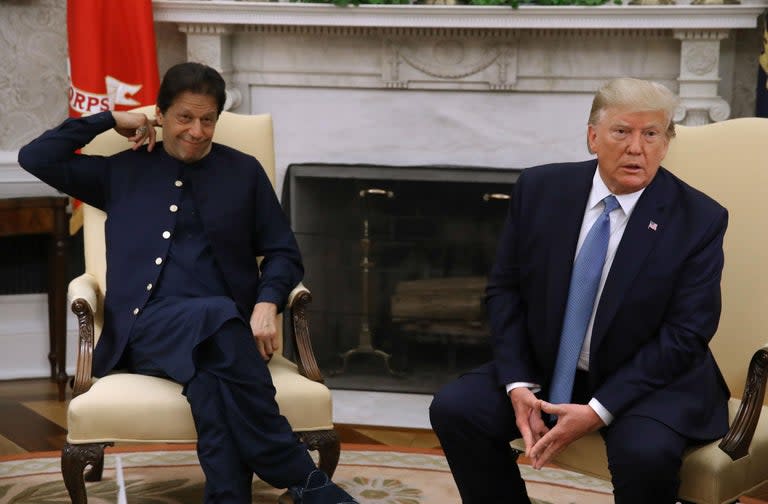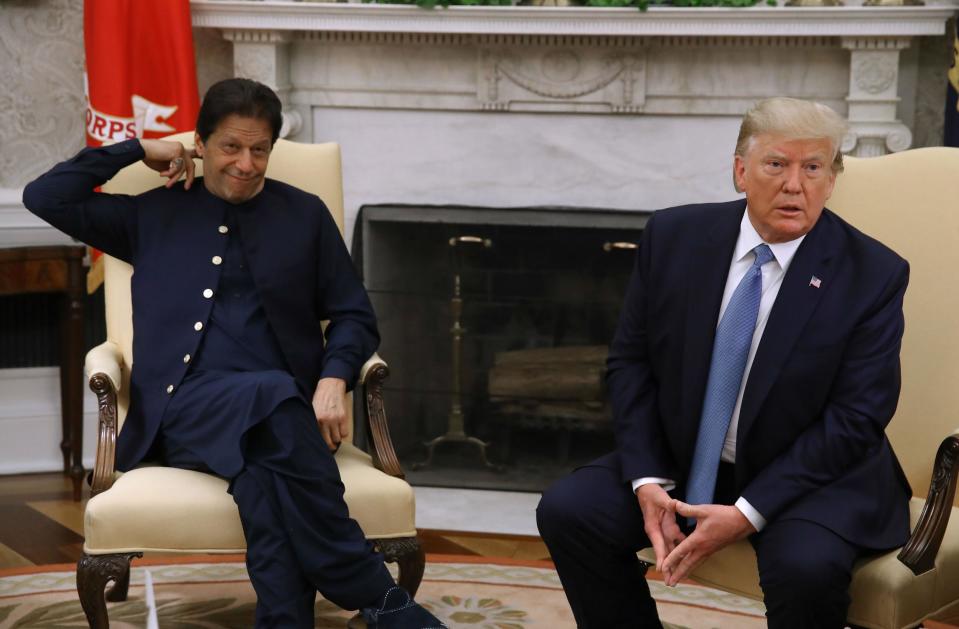No, Imran Khan is not the ‘brown’ version of Donald Trump
While covering the first official meeting between Donald Trump and Imran Khan, it’s easy to fall into the trap of focusing on the similarities between them. However, comparing the US president and prime minister of Pakistan is not just a poor analogy – it’s downright lazy.
Many analysts, including Trevor Noah of the The Daily Show, have also erroneously tried to portray Khan as an example of politicians embracing Trump’s populist playbook, despite the fact that this has been Khan’s message for over 20 years.
Inaccuracies and omissions like these come across as ill-informed, poorly researched and smacking of orientalism. In fact, one could argue that it was a foolish endeavour to view a politician from a completely different culture and context through the prism of Trump in the first place.
While both are populist nationalists with a disdain for local liberals, for example, Khan is a seasoned politician who came into power after nearly two decades of political struggle.
There are countless more similarities. Trump hijacked one of the country’s two established political parties, whereas Khan built his own political outfit, the Pakistan Tehreek Insaf (PTI), from scratch.
While Trump attempted to dilute or destroy the Affordable Health Care Act, Khan has been passionate about creating a social welfare state, providing quality healthcare and education to everyone, regardless of their financial status or background.
In a country where even the federal government had struggled to provide adequate healthcare facilities, Khan founded the Shaukat Khanum Memorial Hospital and Research Centre, one of the most prominent charities in Pakistan.
The PTI led Khyber Pakhtunkhwa, a war ravaged province, and expanded the provision of health insurance to cover over 70 per cent of the provincial populace.
Unlike Trump, Khan is an environmentalist, having successfully implemented a massive environmental conservation program called the Billion Tree Tsunami in Khyber Pakhtunkhwa in order to help combat the effects of deforestation.
While Trump is synonymous with self-aggrandizing displays of wealth that he inherited from his father, Khan is a completely self-made man, earning his money through his career as one of the world’s greatest cricket players. He has criticised the colonial-era mindset and extravagant lifestyles of Pakistan’s ruling elite, choosing to travel on a commercial flight by Qatar Airways on this working trip to the US.
It would be disingenuous, though, to argue that there aren’t any similarities – at least on a superficial level. Both leaders are notoriously thin-skinned and lacking a filter. But both have demonstrated their willingness to work with former critics who have swallowed their pride and changed their tune about them. The two have also been criticised for promising to drain the swamp, but then filling important positions with questionable candidates.
They both command a rabid following, often leaving no room for dissent. Over 30,000 of Khan’s rambunctious supporters filled up the Capital One Arena in Washington DC on Sunday. A small group of protesters were allegedly verbally abused by the crowd and had the cops called on them. However, for all the jibes about Khan being “selected” by the establishment rather than “elected” by the people from his political opponents, you can't really fake that kind of support and enthusiasm, especially overseas.
For Khan, this visit, allegedly arranged through Saudi Crown Prince Mohammed bin Salman, is just a continuation of him turning a blind eye to the human rights abuses and unsavoury track records of certain world leaders in order to – his supporters argue – put Pakistan first. When MBS was being treated like a pariah in the aftermath of the murder of Jamal Khashoggi, Khan ensured he received a warm welcome during his visit to the country. He also famously dodged questions over the alleged persecution of Muslims in China by incredulously claiming he didn't know much about the issue. In fact, just this Sunday, during his speech at the Capital One Arena, he was gushing about how the Chinese government rewards merit.
The unpredictable nature of these larger than life personalities had left many analysts guessing whether the two would get along. They needn’t have worried, because Khan came well prepared to go on a charm offensive and make things work.
It’s not like there was much choice in the matter. Pakistan’s economy is in such dire straits that it can’t afford to snub America or its support. Trump, though wary of entertaining any idea of financial aid, was cognizant of Pakistan’s ability to utilise its leverage over the Taliban in order to facilitate a peace process in the war ravaged nation of Afghanistan. Khan, who has been advocating for a political solution to the conflict throughout his political career, despite consistent criticism, being dubbed “Taliban Khan” by his detractors, will view this as vindication.
In fact, this trip should be considered nothing short of a resounding success for the Pakistan prime minister. Facing discontent back home due to inflation and raised taxes, his showing on the trip would no doubt have reinvigorated his base.
If his critics had been hoping for concerns regarding the freedom of the press in his country, enforced disappearances, or forcefully raising the issue of political prisoners during the talks, they would have been sorely disappointed. When Khan played to Trump’s ego by inviting him to help resolve the Kashmir conflict, even he couldn’t have imagined that the US president would claim Modi had asked him the same thing. India has long maintained that all outstanding issues with Pakistan are discussed only bilaterally. This put India’s Ministry of External Affairs into the awkward position of having to deny the claim – essentially making Trump out to be a liar.
The incident only underscores that one shouldn’t underestimate Khan’s political instincts – something that his opponents have found out the hard way.
What this visit will mean for the long term safety and security of the region remains to be seen, but it’s safe to say that Pakistan-US terms are better than they have been in a very long time.

 Yahoo News
Yahoo News 

